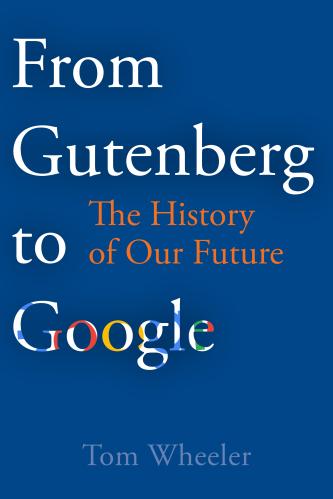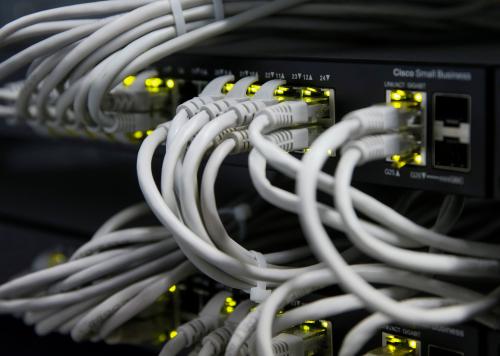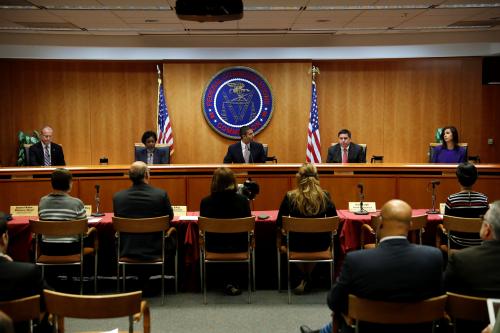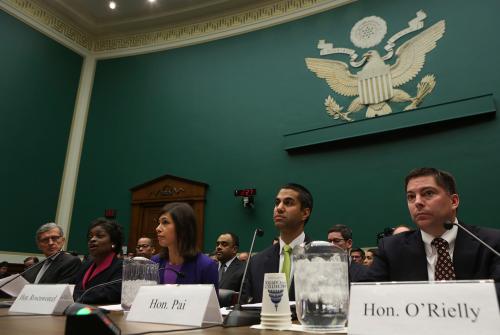On March 12 at 9:00 AM, the Center for Technology Innovation will host an event at the Brookings Institution titled “How can public policy keep up with technological change?” where Tom Wheeler will discuss his recently published book “From Gutenberg to Google: The History of Our Future.” RSVP to attend the event here.
With Democrats in control of the House of Representatives, at least one chamber of Congress could be poised to meaningfully update consumer and competition protection rules for the internet age. In doing so, they would be well advised to follow Republican Theodore Roosevelt’s efforts in the industrial age.
The similarities between Roosevelt’s era and today are striking. Like today, the new technology of the early 20th century drove development of products that significantly improved individual lives. At the same time, the barons of industry amassed huge market power to crush competition and accumulate great wealth.
In his 1905 inaugural address, Roosevelt delivered a message that is as relevant as the latest tweet. “Modern life is both complex and intense, and the tremendous changes wrought by the extraordinary industrial development of the last half of the century are felt in every fiber of our political and social being.” It was time for the nation to “approach these problems with unbending, unflinching purpose to solve them aright.”
The economic powerhouses of which Roosevelt spoke were of two types: the networks that connected the nation and those that used the networks. The economic powerhouses of the internet era have the same structure: dominant providers of internet access and dominant digital platforms that ride on them.
Roosevelt laid out a governing philosophy in a speech to the Philadelphia Union League Club:
“Neither the people nor any other free people will permanently tolerate the use of the vast power conferred by vast wealth, and especially by wealth in its corporate form, without lodging somewhere in the government the still higher power of seeing that this power, in addition to being used in the interest of the individual or individuals possessing it, is also used for and not against the interests of the people as a whole.”
Oversight of the internet economy is no different. Today, the internet barons are making the rules for the new economy. Roosevelt’s admonition is simple: There must be a “still higher power” that makes rules for the protection of the public interest.
For too long, policymakers have been unwilling to touch the idea of rules for those who dominate the internet. With the benefit of the doubt, perhaps they feared losing the magic of something they did not understand. The Trump administration, however, has left no doubt that their actions benefit what TR called “wealth in its corporate form.”
If we are to import TR’s challenge to “approach these problems with unbending, unflinching purpose to solve them aright,” what should be done?
Today, like a century earlier, the first step in rebalancing between the people and the powerful begins with oversight of the dominant network. Roosevelt spoke of the necessity to “keep the great highways of commerce open alike to all in reasonable and equitable terms.” In the 21st century, that highway is the internet. Keeping it open on a non-discriminatory basis has been labeled “net neutrality.” On February 1, the Court of Appeals for the District of Columbia heard the appeal of the Trump Federal Communications Commission’s (FCC) repeal of the Obama FCC’s Open Internet Rule. Democrat lawmakers have introduced legislation in both the House and Senate that codifies the principles of meaningful net neutrality. Reversing the Trump FCC or Congress passing a new law would be the first step toward protecting “the interests of the people as a whole” in the digital era.
The second step comes with the establishment of rules for those who ride on the internet. The Trump Federal Trade Commission (FTC) has made noises, but has yet to step up to this challenge. Speaker Nancy Pelosi (D-CA), sounding like TR, proposed an “Internet Bill of Rights” that begins with the straightforward statement, “it is essential to provide Americans with basic protections online.” Those protections start with a “duty of care”—the obligation to reduce the risks of the digital companies’ practices harming consumers. Today’s internet barons behave just as the industrial barons in Roosevelt’s day, making decisions based on their own interests. New rules need to supersede those self-interests with a basic duty to protect both consumers and competition.
The digital companies are not bad actors—they just have taken advantage of the lack of oversight of their activities. They have acted in accord with human nature and economic self-interest. It is time to return to Roosevelt’s admonition that government exercise its “still higher power” to see that the tremendous technological advances are used in “the interests of the people as a whole.”








Commentary
A Democratic agenda for regulating tech: Follow the Republican Roosevelt
March 8, 2019